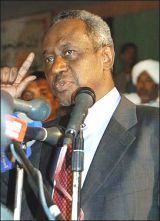Sudan will not allow Darfur crimes suspects to be tried abroad: Taha
KHARTOUM, Feb 5 (AFP) — Sudan will not allow any citizen to be tried abroad in connection with suspected crimes against humanity in the war-torn western region of Darfur, First Vice President Ali Osman Taha was quoted Saturday by the press as saying.
 Taha, speaking at a meeting with officials in South Darfur state on Friday, was referring to an international discussion over whether Sudanese suspected of such crimes be tried by the International Criminal Court (ICC) or by a special tribunal.
Taha, speaking at a meeting with officials in South Darfur state on Friday, was referring to an international discussion over whether Sudanese suspected of such crimes be tried by the International Criminal Court (ICC) or by a special tribunal.
“The government is opposed to trying any Sudanese official or ordinary citizen involved in the Darfur incidents outside the Sudan,” Taha was quoted as saying.
“The government is capable of doing justice among its people in Darfur,” said Taha, adding that Sudan “is a sovereign state committed to the international agreements and conventions it has signed.”
The independent Al-Ayam daily reported Saturday that 51 Sudanese accused by a UN fact-finding commission of committing crimes against humanity in Darfur included 10 senior officials in the national government.
Taha, tasked by President Omar el-Beshir with finding a solution to the Darfur rebellion, set out Friday on a two-day tour of South and North Darfur states.
He said he and John Garang, head of the southern Sudan People’s Liberation Movement, would attend next week’s UN Security Council talks on Darfur and on deployment of UN peace support forces in southern Sudan.
The government signed a peace deal with the SPLM last month, ending two decades of civil war, and shifting the spotlight more to the Darfur conflict.
A UN panel this week blamed government forces and militia it supports for indiscriminate attacks there, including the killing of civilians, torture, enforced disappearances, destruction of villages, rape, pillaging and forced displacement.
However, it stopped short of accusing Khartoum and the militias of genocide against the Darfur population.
The vast region of Darfur has faced what UN experts call a major humanitarian crisis, spawned by a February 2003 uprising by black African groups in Darfur against the Arab government in Khartoum.
Around 70,000 people are estimated to have died in Darfur, many from hunger and disease, while some 1.5 million others have been displaced, many into squalid and dangerous camps.
